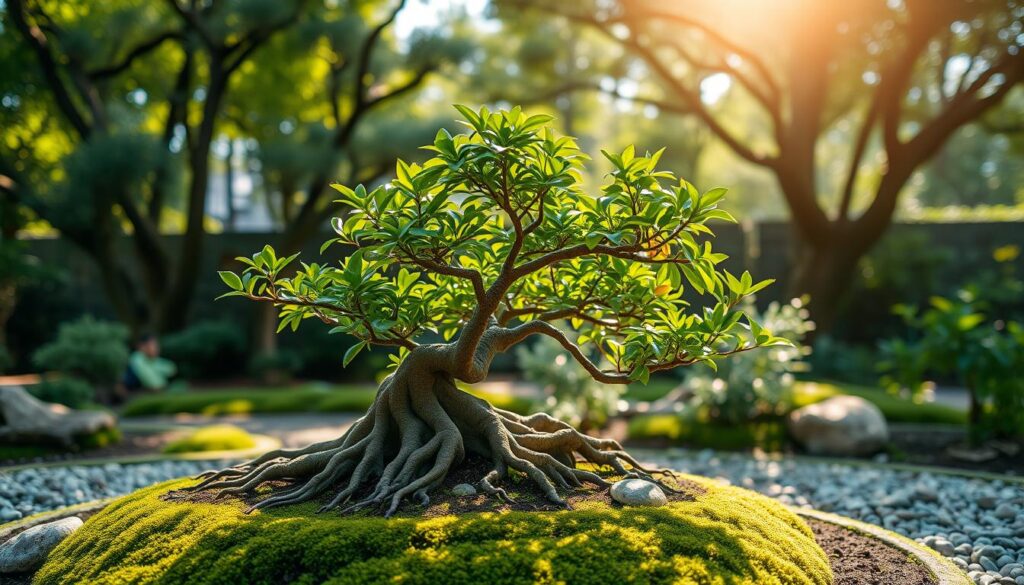Ever thought about the deep meaning behind bonsai trees? These small wonders come from Japan and China, over a thousand years ago. They’re more than just plants; they’re a path to understanding ourselves and nature.
Bonsai teaches us through its detailed art and calm practices. It can change how we see the world and find peace within. It’s a journey that can open our minds and bring balance to our lives.
Key Takeaways
- Bonsai trees symbolize harmony, peace, order of thoughts, and balance in nature
- The art of bonsai cultivation can cultivate spiritual awareness and altered states of consciousness
- Bonsai represents a gateway to understanding the self and our connection to the natural world
- Tending to bonsai trees can promote mindfulness, patience, and personal growth
- The symbolic meanings of different bonsai species can add depth and significance to the cultivation experience
Understanding the Ancient Origins of Bonsai
The art of bonsai has deep roots in Asia’s rich culture, dating back over 2,500 years. It started in ancient China around 700 AD. The art of growing miniaturized trees in containers, called penjing, was believed to give the grower powerful qualities. This led to a deep psychedelic experience and hallucinogenic journey through nature.
In the 6th to 8th centuries, Japanese envoys learned about penjing. They then made it their own, focusing on single potted trees. They used wire and bamboo to shape these tiny wonders.
From Chinese Penjing to Japanese Bonsai
The move from Chinese penjing to Japanese bonsai was a big change. Penjing focused on mini landscapes, while bonsai focused on single trees. This change showed the Japanese values of balance, harmony, and the mix of nature and human touch.
The Evolution of Miniature Tree Cultivation
Over time, bonsai techniques and styles have grown. Each culture has added to this living art. From wiring and pruning to choosing tree species, bonsai shows our desire to nurture and shape nature in awe-inspiring ways.
Historical Significance in Asian Culture
Bonsai is deeply valued in Asian cultures. It symbolizes nature’s strength and wisdom. Bonsai trees are seen as symbols of patience and the balance between humans and nature. This art is part of many Asian traditions, like Taoism, Buddhism, the tea ceremony, and Japanese gardening.
“Bonsai is a living work of art, a silent poem, and a masterpiece of natural beauty.”
The Spiritual Connection of Bonsai Trip Meaning
The ancient art of bonsai is deeply spiritual in Zen Buddhism. It’s seen as a way to find inner peace through contemplation and meditation. Growing these tiny trees is a lifelong journey, blending nature and art perfectly.
Bonsai trees are thought to add elegance, beauty, harmony, and serenity to any home or garden. They symbolize the spiritual connection between humans and nature.
The spiritual meaning of bonsai trees includes contemplation, meditation, and finding harmony. Each species, like the cherry blossom, has its own meaning. They reflect the cycles of life and the fleeting nature of existence.
The art of bonsai combines horticulture and art, pushing gardeners to grow their skills and creativity. Caring for a bonsai tree requires patience. Rushing can slow its growth by months or years.
“Bonsai symbolizes simplicity through the achievement of beauty with natural elements alone, without excess or elaborate additions.”
Bonsai is deeply connected to Zen philosophy, offering a path to mindfulness and being present. It invites practitioners to see beyond their own views, connecting deeply with nature and themselves.
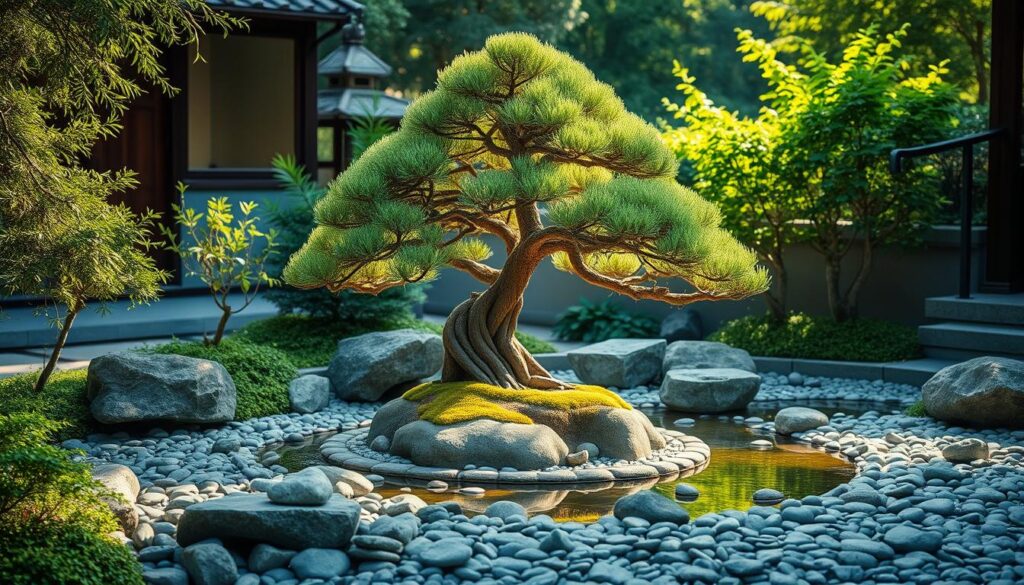
Bonsai as a Gateway to Altered Consciousness
The art of bonsai cultivation is a special way to reach altered states of mind. It involves meditation and deep thought. The care needed for these small trees can lead to a state of deep focus and mindfulness. This can open the door to transcendent awareness and a mind-expanding adventure.
Meditative States and Mind Expansion
Pruning, shaping, and caring for a bonsai tree can put you in a meditative state. As you focus on the plant, your mind becomes very present. This can make you more aware and concentrated. It can also help you see things from a new perspective.
The Role of Contemplation in Bonsai Practice
Bonsai cultivation makes you think deeply about nature and yourself. Tending to these small trees and watching them grow can make you feel connected to the world. This way of thinking can help you understand life’s cycles and how everything is connected. It can lead to a transcendent awareness of your role in the universe.
Achieving Transcendent Awareness
Practicing bonsai can lead to personal growth and spiritual exploration. The patience and detail needed in this art can make you more aware of yourself. It can help you let go of ego and find a more expansive, transcendent awareness of who you are.
“The bonsai tree is a living sculpture, a miniature manifestation of the essence of the natural world. Its cultivation is not merely a horticultural pursuit, but a contemplative journey towards a deeper understanding of ourselves and our place in the universe.”
Symbolic Meanings of Different Bonsai Species
Exploring bonsai is like starting a journey of self-discovery. Each bonsai tree has its own special meaning. These meanings connect us to our culture and help us find ourselves.
The Chinese Elm bonsai is called the “tree of harmony.” It stands for inner strength, intuition, love, and wisdom. The Fukien Tea Tree shows courage, heart, love, and devotion. The Ficus Bonsai is linked to health, fertility, and love.
The Jade Bonsai, or Money Tree, is thought to bring luck and wealth. Bonsai art is deeply rooted in Asian culture. The Chinese “penjing” and Japanese “bonsai” traditions give these small trees deep spiritual value.
| Bonsai Species | Symbolic Meaning |
|---|---|
| Chinese Elm | Inner strength, intuition, wisdom, love |
| Fukien Tea Tree | Courage, heart, love, devotion |
| Ficus Bonsai | Health, fertility, love |
| Jade Bonsai | Good luck, prosperity |
Keep exploring bonsai and its deep meanings. These small trees carry a lot of cultural value. Let them guide you on your journey of self-discovery.
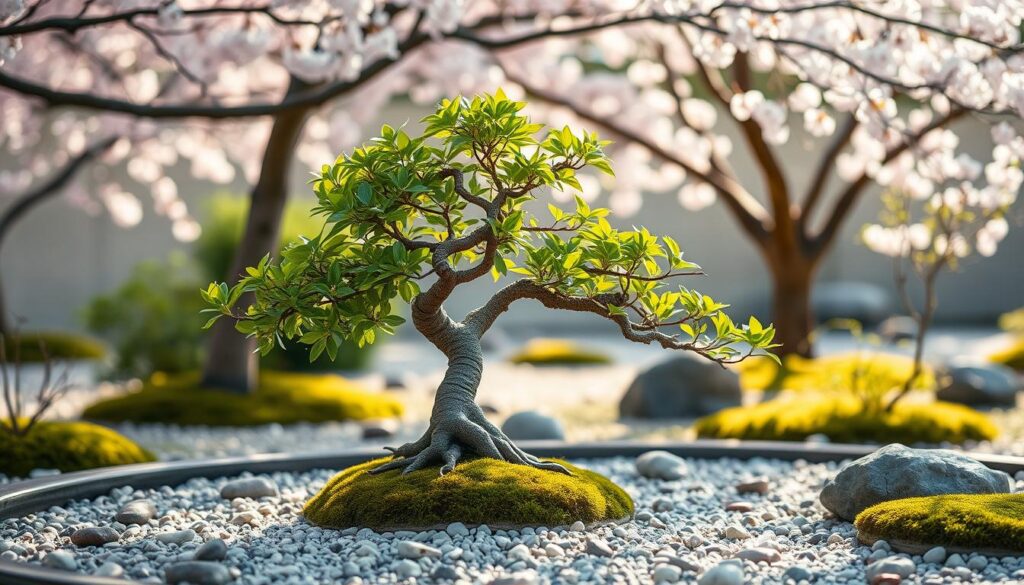
“Each bonsai tree is unique, intentionally crafted to tell a story and add to its symbolism and aesthetics.”
The Zen Philosophy Behind Bonsai Cultivation
Bonsai cultivation is deeply connected to Zen philosophy. It focuses on mindfulness and being present in the moment. The art requires a balance between human effort and respecting nature’s beauty. This balance mirrors Zen’s idea of harmony between the self and nature, leading to a deep connection and altered consciousness.
Mindfulness and Present Moment Awareness
Cultivating a bonsai tree needs intense focus and being fully present. Bonsai lovers must carefully prune and shape their trees, making it a mind-expanding adventure. Every decision and action must be made with complete awareness, showing patience and sensitivity to the tree’s needs.
Balance Between Nature and Human Intervention
Bonsai art shows the Zen idea of harmony between nature and human touch. Growers work together with their trees, guiding them while keeping their natural essence. This balance is crucial, as bonsai trees must look mature and natural despite the shaping and pruning they receive.
“Bonsai cultivation is likened to raising children, emphasizing the ongoing process and lessons of perseverance and kindness.”
The Zen philosophy behind bonsai highlights the power of altered consciousness and mind-expanding adventure. By focusing on mindfulness and balance, bonsai lovers start a journey of personal growth and spiritual discovery.
Exploring the Introspective Journey
Cultivating a Bonsai tree is like a deep introspective odyssey. It’s often seen as raising a child. The grower must commit fully, ensuring the tree’s survival and shaping its form. They also meet its changing needs over time.
This journey helps the Bonsai enthusiast understand their plant deeply. They see its growth and its unique character emerge.
The spiritual exploration in Bonsai cultivation is like a personal journey. It mirrors raising a child, needing unconditional faith and dedication. This process can reveal much about oneself and one’s place in the world.
“Crafting a Bonsai tree can take years or even decades to shape to its desired form, reflecting the perseverance necessary for personal growth.”
The detailed pruning and training of a Bonsai tree show the discipline needed for inner growth. Each task, from watering to shaping, is a meditative act. It promotes mindfulness and being present in the moment.
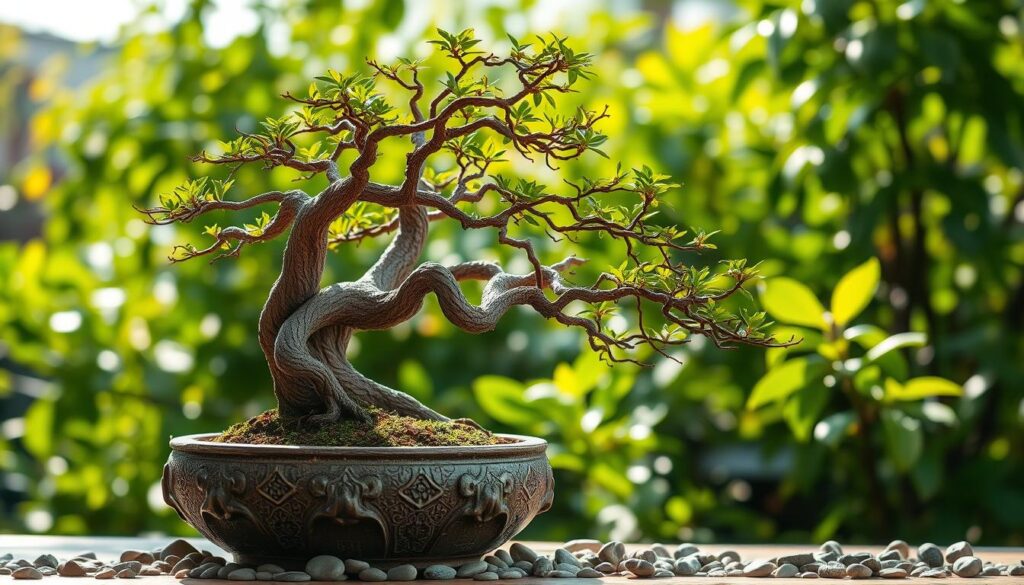
| Bonsai Cultivation Insights | Personal Growth Parallels |
|---|---|
| Precision and patience in training | Dedication to self-improvement |
| Harmonious integration of natural elements | Spiritual connection to the universe |
| Mindful attention to the tree’s needs | Cultivating present-moment awareness |
The bonsai art has a long history, over a thousand years. Each Bonsai tree is a concentrated form of nature. It symbolizes the deep bond between the individual and the natural world.
The Art of Bonsai as a Transformative Experience
Bonsai tree cultivation is a journey that can change you deeply. It teaches patience, discipline, and personal growth. These small trees need care for years, sometimes decades. This dedication can reveal new insights and shape your character.
Personal Growth Through Plant Cultivation
Working with bonsai can be emotionally rewarding. It’s like meditation, teaching you to relax and be mindful. By shaping a bonsai, you express your creativity and learn to appreciate nature’s balance.
Developing Patience and Discipline
Growing bonsai requires dedication and focus. The years spent pruning and caring for these trees teach discipline and patience. Bonsai lovers often find they become more focused and self-aware.
The journey of growing bonsai is a deep, personal one. It’s about the insights and growth you gain from caring for a living thing. Through bonsai, you connect with nature and discover more about yourself.
“Bonsai is a living, breathing art form that has the power to transform us from the inside out. It’s not just about the tree, but about the journey of self-discovery that unfolds alongside it.”
Bonsai has ancient roots in China and Japan. These trees symbolize nature’s harmony and balance. As outdoor bonsai trees continue to inspire, they offer a unique path to personal growth and self-discovery.
Cultural Significance and Modern Interpretation
Bonsai is an ancient art form that has grown from a symbol of wealth in China and Japan to a global symbol of harmony and strength. It started in East Asia but now attracts fans all over the world. They see bonsai as a way to explore the spiritual and find mystical revelation in these tiny trees.
The Philodendron Jose Buono is a rare bonsai that shows the lasting charm of this art. Its bright green and white leaves, from South America’s rainforests, are eye-catching. It’s also easy to care for, making it perfect for both new and experienced bonsai lovers.
Bonsai is more than just a pretty plant. In Japan, it’s linked to Zen Buddhism, encouraging a deep connection with nature. Growing a bonsai is like balancing human life with the natural world, teaching us to appreciate our place in it.
In East Asia, bonsai shows different cultures’ views on life and art. Chinese Penjing focuses on living in harmony with nature, while Korean Bunjae highlights the importance of the tree’s trunk and roots. These traditions show the deep cultural significance of bonsai.
Today, bonsai is seen in new ways, mixing old techniques with modern styles. New bonsai pots and displays make it more accessible and beautiful. This makes bonsai a universal and transformative experience for all who try it.
“Bonsai trees are living records of history, growing richer in character with each passing year, reflecting wisdom accumulated over time.”
Bonsai’s lasting impact shows the power of spiritual exploration and mystical revelation through nature. As it grows and reaches more people, it connects us to the natural world and teaches us about balance.
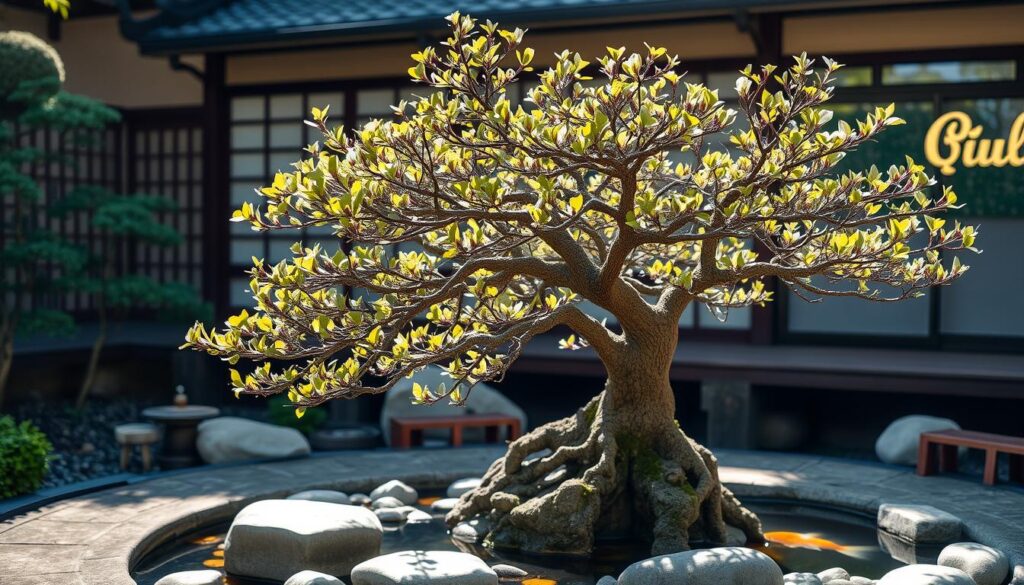
The Connection Between Bonsai and Ego Dissolution
The art of bonsai cultivation can help break down our sense of self. It makes us see ourselves as part of a larger whole. By caring for a bonsai, we learn to let go of our ego and understand our place in the world.
Understanding the Self Through Nature
Creating bonsai trees is a meditative process. It helps us see beyond our own selves. We start to feel connected to the natural world and the bonsai’s life force.
Breaking Down Mental Barriers
Bonsai art teaches us patience and respect for nature. It helps us let go of old ways of thinking. This way, we open up to new experiences and connections.
“The bonsai tree’s journey is a metaphor for our own personal growth and transformation. As we nurture and shape these miniature trees, we are also shaping our own minds and perspectives.”
Learning from bonsai can deepen our self-awareness. It helps us see the world as a connected web. This journey can lead to personal growth and a better relationship with nature.
Mystical Elements in Bonsai Practice
Bonsai practice is more than just growing small trees. It’s filled with mystical elements that connect us to nature. Many feel a deep mystical revelation or spiritual exploration when they work with their bonsai trees.
The art of bonsai is linked to Asian philosophies like Zen Buddhism and Daoism. Practitioners feel a strong bond with nature. They find mindfulness and presence in their bonsai work.
Some bonsai species, like the Japanese white pine Chabo Hiba, are seen as having special powers. When caring for these trees, practitioners often have altered consciousness and deep insights.
“The bonsai tree is a living, breathing manifestation of the mystical forces that permeate the natural world. In its miniature form, we can glimpse the boundless wisdom and power of the universe.”
Bonsai is more than growing small trees. It’s a journey of spiritual exploration that connects us to nature’s rhythms. This connection brings peace, clarity, and a deeper understanding of life.
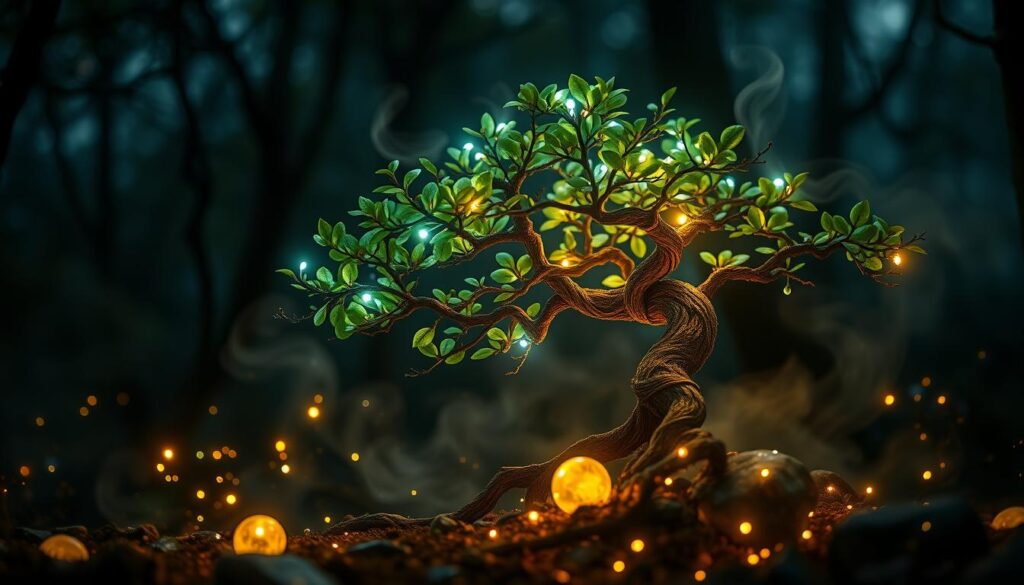
The Role of Time and Patience in Bonsai Journey
The world of bonsai trees is a captivating introspective odyssey. It shows us the importance of time and patience in a mind-expanding adventure. Bonsai, an ancient Japanese art, has roots in ancient China. It shows the power of slow growth.
The oldest bonsai tree is over 1,000 years old. This shows how long these trees can live. Growing a bonsai tree means understanding nature and guiding it for years. It teaches us about time and change.
Patience is key in bonsai. This practice makes us more aware and present. It helps us grow personally and find inner peace.
“The art of bonsai is not merely about shaping a tree; it is about shaping one’s own perception of time, patience, and the interconnectedness of all living things.”
Knowing about seasons, pruning, and watering is crucial. These tasks might seem simple but are deep explorations of nature. They show the beauty of slow growth.
Bonsai teaches us to value time and patience. It’s a journey that shows us the power of slow growth and connection with nature. It’s a refreshing way to live in a world that values quick results.
Therapeutic Benefits of Bonsai Cultivation
Working with bonsai trees can greatly help your mental health. It can lower stress and improve your mood. The care needed for these small trees can make you feel calm and focused.
Stress Reduction and Mental Clarity
Research shows bonsai trees can lower stress hormones. This makes you feel better and more relaxed. The tasks involved in bonsai care are calming, like meditation, helping you stay present.
Emotional Healing Through Plant Care
Growing bonsai plants can boost your self-esteem. Watching them grow from start to finish is rewarding. It also makes you appreciate nature more and teaches patience and resilience.
Bonsai gardening is good for your mental and physical health. It brings a piece of nature into your home. This can help you feel more connected to the world around you.
| Participant Type | Number of Participants | Gender Distribution | Years of Bonsai Experience |
|---|---|---|---|
| Amateur Bonsai Artists (ABA) | 161 | 28 females, 127 males | Mean of 20.8 years |
| Professional Bonsai Artists (PBA) | 11 | All males | Mean of 35.2 years |
Bonsai cultivation is not just good for you; it’s also good for society. Bonsai plants and green spaces improve mental and physical health in cities. It offers a break from the stresses of everyday life.
“Bonsai cultivation can encapsulate the natural wonder of green spaces in a manageable amount, providing individuals with the opportunity to experience the therapeutic benefits of nature within their own environment.”
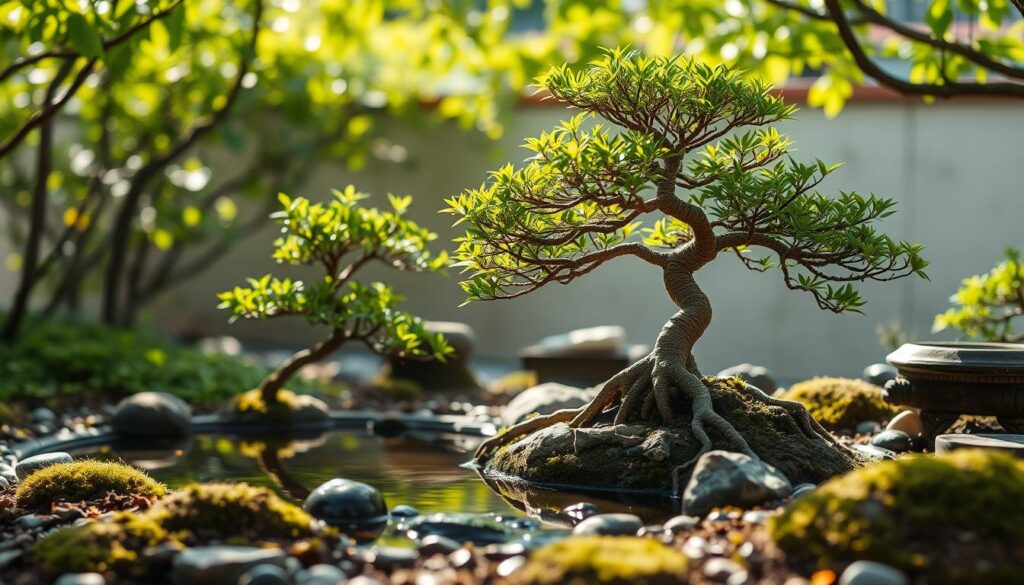
The Path to Spiritual Enlightenment
Many Bonsai fans see this hobby as a deep journey to spiritual enlightenment. It’s about finding harmony, balance, and respect for nature. Bonsai growing connects us to the natural world and helps us find new insights.
By carefully tending to Bonsai trees, people can have deep spiritual awakenings. This journey helps us see beyond ourselves and understand the world in a new way. It’s like a Zen practice that helps us grow and find our place in nature.
Watching a Bonsai tree grow and change teaches us about life’s cycles and our connection to everything. It teaches us to live in the moment. For centuries, Bonsai has been a path to personal growth, peace, and a deeper love for nature.
